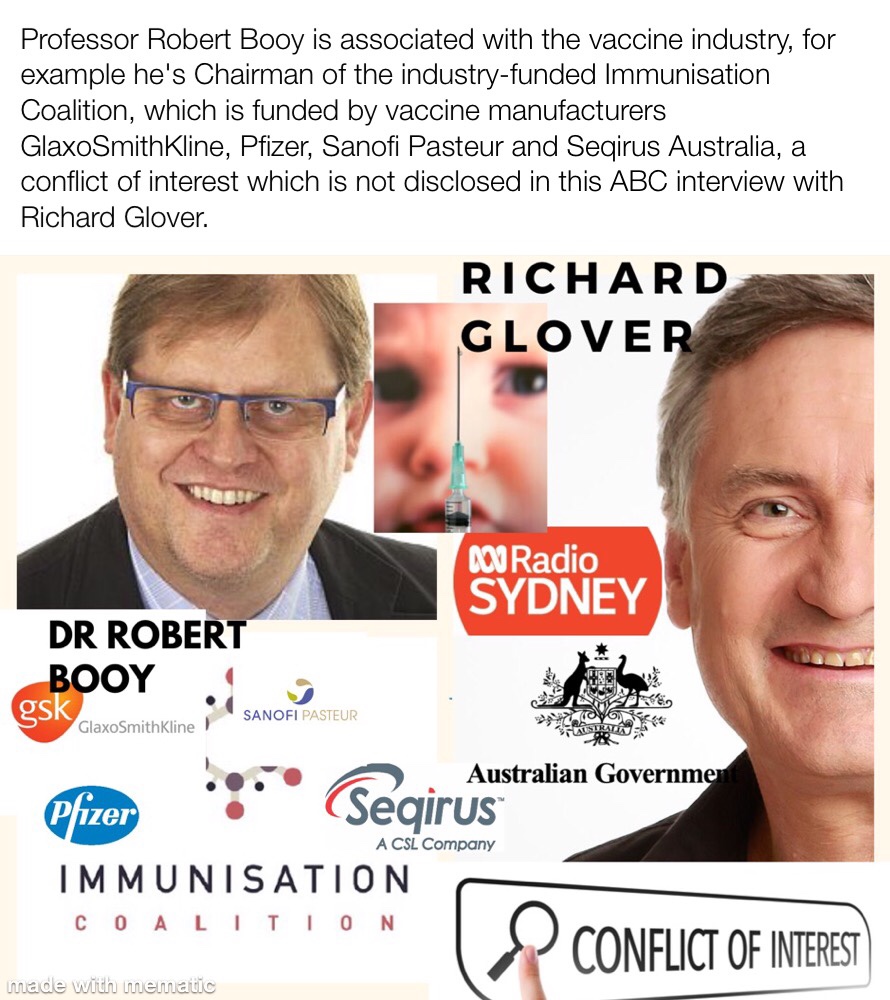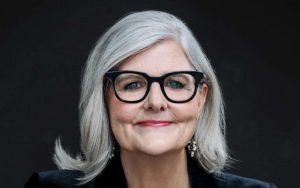ABC Radio vaccine interview with Robert Booy fails to disclose pharmaceutical conflicts of interest


READ MORE AT FREEDOM OF CHOICE
Emails from Elizabeth Hart of Over Vaccination https://over-vaccination.net to Richard Glover regarding an interview on ABC radio which was broadcast on Monday 4 March 2019.
(6 March 2019) Mr Glover, re your recent interview with Robert Booy re vaccination.
You did not disclose Robert Booy’s conflicts of interest, e.g. that he is Chairman of the industry-funded Immunisation Coalition which is funded by vaccine manufacturers GlaxoSmithKline, Pfizer, Sanofi Pasteur and Seqirus.
Please note vaccination policy is a complicated area, it’s not just about measles vaccination. The taxpayer-funded ABC is failing to provide critical analysis of vaccination policy and government-mandated vaccination. There is much that the community is being kept in the dark on this matter, e.g. the conflicts of interest that surround vaccination policy. For some information on this matter see below the referenced transcript of my interview on radio station 2ser which also includes reference to Robert Booy. It’s about time the ABC lifted its game and investigated the lucrative and burgeoning taxpayer-funded vaccination schedule.
(8 March 2019) Mr Glover, further to my previous email relevant to the politics of vaccination…
The ABC and other media reports that “a Danish study refuted once again the notion that the MMR vaccination, which protects against measles, mumps and rubella, has no association with an increased risk of autism”.
As per usual, commentary and analysis on this subject was facile, e.g. the discussion between the ABC’s Fran Kelly and Ariel Bogle: https://www.abc.net.au/radionational/programs/breakfast/tech-with-ariel-bogle/10878214
Given your own strong stance on vaccination policy Mr Glover, and your privileged position of being able to influence public discussion, perhaps you might be open-minded and interested enough to read some criticism of the Danish Study?
Comments are being published on the paper’s webpage (Click on the ‘comments’ section in the column on the left-hand side): https://annals.org/aim/fullarticle/2727726/measles-mumps-rubella-vaccination-autism-nationwide-cohort-study
Click here to access a copy of the comments posted so far on this Danish Study. I suggest it is important to keep an open mind on this matter Mr Glover, and allow free discussion, not censorship as campaigned for my coercive vaccination lobby groups such as SAVN and Friends of Science in Medicine…
Elizabeth Hart
Please see below a transcript of the recent radio interview relevant to the current measles scares going on around the world, and also possibly timed to coincide with the latest publication purporting to debunk the MMR / autism link: https://annals.org/aim/article-abstract/2727726/measles-mumps-rubella-vaccination-autism-nationwide-cohort-study
This interview was broadcast on Monday 4 March 2019, and audio can be accessed via this webpage, starting at around 54.40: https://www.abc.net.au/radio/sydney/programs/drive/drive/10848602
And can be heard on YouTube here
See transcript below:
Richard Glover: G’day, Richard Glover with you on ABC Radio Sydney. Today, how the world lost its way on vaccination. And are people right to say Australia might have the answers? We’ll take an expert view on that first up…
Resume at 54.40
Richard Glover: Well, you’ve got to hand it to the human race, we seem to have the ability to grab defeat from the jaws of victory. An example, our attitude to vaccines. What a gift when they were developed. With their help, death from infectious diseases fell all over the world. Some diseases even disappeared entirely. Witness that great Wikipedia entry on smallpox, which begins “Smallpox was a disease which…” etc, etc, etc. Now though, thanks partly to the rise of anti-vaccination movements, there’s an alarming global surge of diseases such as measles. Just today, the international body UNICEF, noted a boom in measles in countries around the world. In Ukraine 30,000 cases. In the Philippines,13,000. Another 10,000 in Brazil, which used to have no cases at all. Even in the United States, a congressional subcommittee has met to discuss measle outbreaks in New York, Texas, Illinois and Washington State, where the governor has recently declared a state of emergency. This for a disease believed to have been eliminated in the US at the turn of the millenium. Well what to do? Some foreign observers are citing Australia as an example of a country that is winning the battle through changes in public policy. Just yesterday, an article in The Times, London, cited Australia’s vaccination requirements for children enrolling in school and the ability to withhold family benefits as crucial bits of public policy. So what is the Australian model, has it really made a difference, and could it be an inspiration to others? Well, Professor Robert Booy is from the National Centre for Immunisation Research & Surveillance, and joins us here in the studio. Good afternoon.
Robert Booy: Good afternoon Richard.
Richard Glover: These figures must be so alarming to a person like you?
Robert Booy: Well, I’ve come to expect them. I’ve been in the field for decades. And I was there 20 years ago when we announced elimination of measles from the US. I was there five years ago when we announced elimination of measles from Australia. So these are things that ah we have to fight against. Measles is so contagious. You have to have 19 out of 20 people to be immune to be sure of stopping it in its tracks, stopping it from transmitting. So it’s going to come back, but in little ways. You know, there used to be there were thousands and thousands every year or two. Now it’s, you know the US is very upset about having a hundred cases, so it’s, it’s on the scale of things, much less, but it is something that’s really hard to totally nail down.
Richard Glover: Ok. Some listeners might remember, older listeners, listeners of my age, of having measles when they were growing up, you know maybe no big deal. But of course in some cases there are complications and there are deaths. I mentioned the Philippines, well they’ve had 203 deaths in the last year.
Robert Booy: Without a doubt measles can kill. About 1 in a thousand. That’s in Europe as well. So it’s not just in poorer countries that have not as good medical care, it’s all over the world, one in a thousand. And a similar number get left with very severe encephalitic brain damage. Whether that’s acutely, or it occurs some years later. You can really get bad damage from measles. Not only kill you, it can give you pneumonia, and give you ear infections. Most people recover ok though.
Richard Glover: We’ve got some countries in which it was virtually eliminated, and now it’s back. Is this mainly due to anti-vaccination movements?
Robert Booy: It think that’s a contributor, but not the main one. Travellers from Australia have been to Asia, have been to the US, to Europe, and they’ve brought it back with them. It’s actually people who aren’t immunised. If you’re a teenager or an adult, and you’re travelling, you’ve got to make sure you’ve had two doses of vaccine, against MMR, against measles, mumps, rubella, and that provides very strong protection, you won’t catch it overseas, and you won’t bring it back, you won’t spread it in your community. So we have the biggest risk, I believe, from travellers, but to a lesser extent, those who deny vaccination, they’re hesitant, they’re worried, they think it’s going to damage them in some way, they do contribute. You mentioned earlier that we’ve got an approach in Australia, No Jab, No Pay / No Jab, No Play, there’s a governmental changes that occurred at both the state and the national level. Well we’ve only had a 1.4 percent increase in vaccine uptake, so we’ve gone from something like 93 to 94 and a half. So it’s been an improvement, but there’s a lot of other things that are going on, I’d happily describe them to you.
Richard Glover: Ok. So I mean, I ask that partly because there are all these overseas commentators who are looking to us. You’d say the Australian stuff has worked but don’t think it’s some sort of panacea?
Robert Booy: No it’s not a panacea, because there’s a bunch of other really good things that have been happening. A colleague of mine at the University of Sydney, Julie Leask, is working with the WHO around this whole question of hesitancy. How we can reassure parents, and give them the information they need to stop them from worrying, and allow their children to be vaccinated.
Richard Glover: Ok, but that must be frustrating for doctors, because in a way it all comes down to this one article in The Lancet magazine, 1998, I think it was. Absolutely disproved now, The Lancet itself has withdrawn it. And yet that’s what caused the panic.
Robert Booy: It’s crazy. I was there then in London and I was one of the people who wrote immediately to The Lancet to say this is rubbish research. And yet it took a decade to get rid of.Look, things like that, people grab onto. They want to believe it. We have to listen to them, we have to understand them. And we have to take approaches that are more than just giving the facts.
Richard Glover: Ok, I suppose you’re saying we should understand that parental anxiety is a pretty important, pretty central part of being a parent isn’t it?
Robert Booy: You bet.
Richard Glover: And if you put an anxious idea into people’s head, you know, you do need to work at it to remove it. All the same, you know this is often a middle-class thing, it’s a thing that for instance, these north coast of New South Wales, socially progressive communities, seem to have particularly embraced it. These are communities where in most of their behaviour, they’re pro-science, they’re people who believe in global warming, and they’re mostly in their behaviour mainly very pro-community too, they believe in, not in some sort of idea of individualism, but of community action. And yet on this policy, they seem to behave entirely the opposite way on both those things!
Robert Booy: Yeah, it’s perplexing. I had the opportunity to go to Byron Bay ten years ago to meet with parents, to speak one on one with parents for an hour. Most of the ones I spoke to were very happy after they’d had it all explained to…And then they become pro-immunisation and they become the zealots and the evangelists for immunisation. So you can change things. There are a small proportion, maybe one or two percent, where you just can’t convince them, and you’re better off not trying, because you’ll just waste each other’s time.
Richard Glover: Ok. So, you know, proper, reasoned, kindly discussion is important. But the No Play, or No Pay, No Jab, No Play, No Jab, No Pay, these are important too aren’t they?
Robert Booy: Look, they’ve made a contribution, but the only measurement we have is that it’s gone up by about 1.4 percent overall.
Richard Glover: That’s not bad though is it?
Robert Booy: It’s not bad…
Richard Glover: …You explain the science to me a bit, I keep on hearing these figures of 94 percent, 95 percent, something like that, that gets you herd immunity. So the difference between 90 and 95 might be everything?
Robert Booy: Well, there isn’t a magic tip over point. For every community it’s slightly different. And to imagine that, if we could only go from 94 to 95 would make a massive difference, is not a truism, it’s not correct. Actually, we’re already getting good herd immunity at 90, 91, 92, it’s just improving each time. And you know you might be able to argue there’s a tipping point. But then new babies are born who aren’t immune and then it changes immediately.
Richard Glover: I think one of the attractions of the Australian policy and I get this through overseas eyes, is that in places like England where they’ve got really no public policy controls at all, they’re either looking at two things. One, is this Australian model, whereby you use things like school rules and payment of family tax benefit and that sort of thing to try to encourage people. The other model is the European model, a third of the countries in Europe apparently, it’s mandatory, so absolutely hardline. You’ve got to do it.
Robert Booy: Yeah, mandatory approaches have been tried on and off for a hundred and fifty or more years, and it does create opposition. So it’s not always the panacea you’re looking for, it can actually be problematic. I worked in the UK for fifteen years, I ran a study which vaccinated 20,000 children in the Oxford community, we got 95% uptake, with an unlicensed vaccine.Why? Because the nurse and I went round, listened to people, educated them, and this was in the 90s, so maybe things have changed. But just simple information, providing information that is credible. And, you know, you’re on call 24 hours a day, and so if there’s a concern, you answer the concern. And we got a great outcome.
Richard Glover: That is the best way you say. I mean, having said that, are you an opponent of the No Play, No Pay? You sound as if you’re kind of unsure about it?
Robert Booy: Yeah, I’m a bit on the fence. I’ve always felt that caring about people and the information you provide was the key, and then the No Pay, No Play may add a little bit.
Richard Glover: Yeah, alright. But at a time when places like the Ukraine, Philippines, Brazil, you just wish them, whatever method they’re going to use, they’ve got to find some way of providing it. Because in some countries the problem is actually provision rather than anti-vaxxers, it must be said. Both providing it, and somehow, whether through laws, or whether through that sort of sweet-talking you’re talking about, somehow confronting this movement.
Robert Booy: Yeah,you’ve hit the nail on the head actually about access, and about providing it. The biggest change we’ve been able to make is improving access. Having clinics late in the day, on the weekend. So, there’s been the bigger gap, that’s been, you know, three percent, whereas, you know, one and half percent might be the people who are dead-set vaccine anti.
Richard Glover: Ok. So if they’re looking at the Australian model so-called, yes, look at the changes to Family Tax Benefit A and all of that, but also look at the Australian model being about provision, access and…
Robert Booy: Yep, you bet…
Richard Glover: …and actual, you know, debate, discussion, information.
Robert Booy: Yeah, and you know some really smart minds in social science are in Australia leading the way in working out how to provide support first of all to health professionals, and then to parents. (My emphasis.)
Richard Glover: Ok. Get that stick out, but get the carrot out whilst you’re at it. Professor Robert Booy, thank you very much for coming in and talking to us.
Robert Booy: You’re very welcome.
Richard Glover: Professor Robert Booy is from the National Centre for Immunisation Research & Surveillance at the University of Sydney. Yeah, UNICEF among others, get very worried about this upsurge in measles around the world. You’re listening to ABC Radio Sydney.








